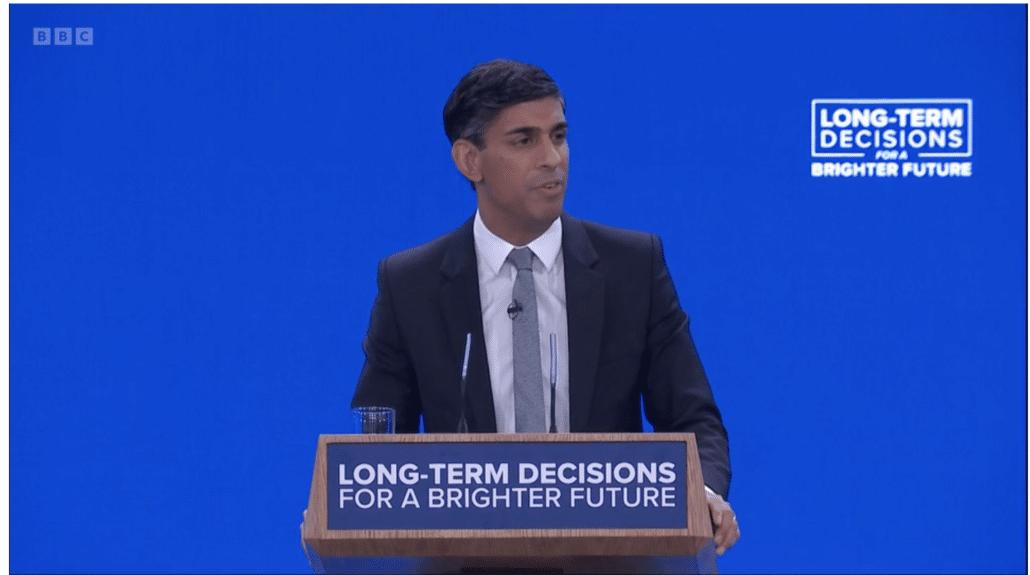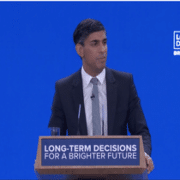Why Repetition is Risky – Especially When You’re Rishi
Time and again during Media Coach training sessions, we warn about the dangers of repeating the language of the interviewer’s question in your answer.
But time and again, out there in the real world, interviewees fall victim to making precisely that mistake. Even if they manage to avoid doing so in the first few seconds of their response, they often return to it a little later.
And this even happens when they are media-savvy interviewees such as the UK Prime Minister.
Last week provided a perfect example of this taking place. Rishi Sunak was being quizzed about his government’s announcement to cancel the proposed HS2 train project north of Birmingham.

His interviewer – picking up from the words of Sunak’s critics – suggested that this meant the downgraded version of HS2 would be reduced to a “shuttle service”.
When this was put to him by the BBC, Sunak initially managed to avoid the risky repetition:
“It is wrong to describe it as that. Actually, if you look at all the previous business cases that the government of the day, what HS2 themselves said, everybody said, that phase one connecting Birmingham to Euston in and of itself as a standalone project had a very strong case and will bring substantial benefits.”
So far, so good. This is a denial (although not a particularly powerful one) of what the PM thinks won’t be the case and an assertion of what he believes will happen.
But having potentially dodged that linguistic bullet, he nevertheless falls victim to it later – astonishingly after he’d put some 66 words between the interviewer’s use of the phrase and his own:
“For those people now to say that somehow that is a shuttle service is them not being truthful about what they said previously.”
Aaaargh! Those toxic words – the very ones which Sunak believes don’t accurately portray the future – have now come out of his mouth, and he can therefore be quoted saying them. Which is precisely what happened. And what’s worse, not just in the original report but also in the headlines of various news outlets that wrote up the interview.
The BBC website went with “Downgraded HS2 not just a ‘shuttle service’, insists Rishi Sunak”. Interestingly and unusually this story has now been removed. But several other outlets picked up the phrase.
It’s easy to see why this happens. However careful the interviewee initially may have been to avoid the repetition, the phrase has clearly stuck in their mind (which is what powerful phrases do!) and so moments later, when their guard has dropped, they return to it anyway, in order to deny it.
Instead, how much more powerful would it have been for Sunak to have done the following:
1) Firmly denied the interviewer’s assertion, but without using the toxic phrase itself. So instead of saying merely “It’s wrong to describe it as that…”, he could have used a more powerful denial – e.g. “Absolutely not…”, “Categorically not…” or “That’s simply not true…”
2) Then used a bridging word or phrase to transition towards something he would like to be quoted as saying – e.g. “In fact…”
3) Then stated what he believes to be the case in a phrase which is powerful enough to be used as a quote in its own right – e.g. “What we’re proposing now is to return to the benefits of the original blueprint – a standalone service which the very same people once said could be a success…”
Sunak, of course, knows this. His communications team will have told him so time and again. But he’s human, and it happens.
But if you want to prevent the media from writing your headlines – even if you don’t have the news-grabbing potential of a Prime Minister – the same rules apply.
Avoiding having words put in your mouth by journalists is just one of the tips we offer in our regular media training sessions. Call us on 020 7099 2212 or email enquiries@themediacoach.co.uk, if that is something that might be useful to you or your team.
- Introducing the ‘Act Out’: - October 29, 2024
- Politics as Entertainment - July 2, 2024
- All Presenters Need a Critical Friend - April 23, 2024





Leave a Reply
Want to join the discussion?Feel free to contribute!